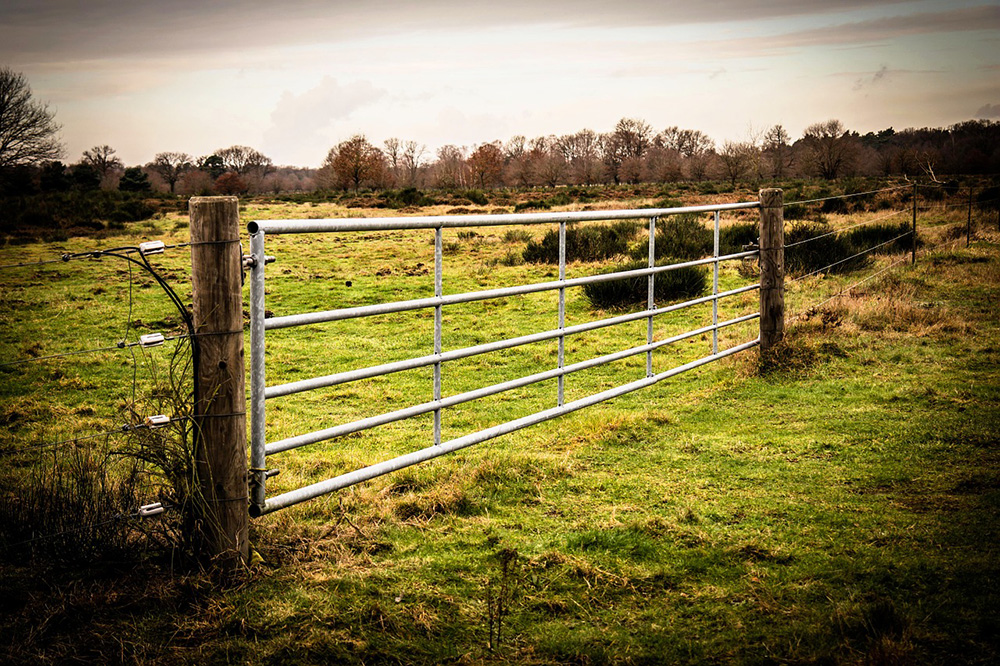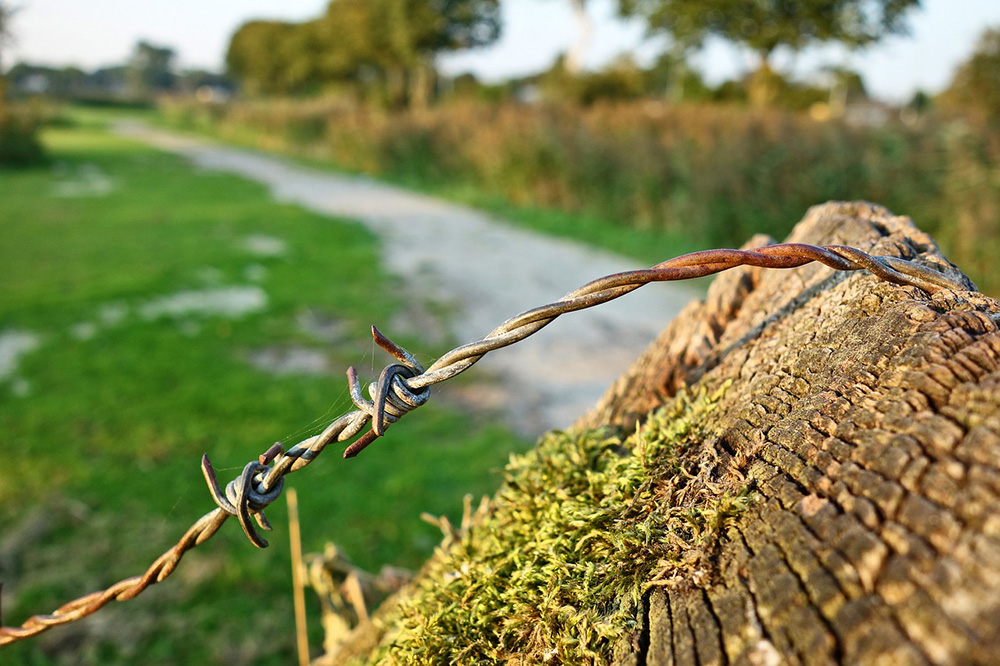by Conrad Novak
While living off the grid can provide you an immense sense of freedom, it also carries with it a similar degree of responsibility. Without the common services that municipal communities provide, you are ultimately responsible for all of these functions on your own. While that may not seem like much of a big deal for most of these services, there is one in particular that definitely stands out above the rest: security.
Because your home off the grid is likely also outside of most jurisdictions and almost certainly too far from whatever regional jurisdiction’s headquarters is located to reach you quickly should you need assistance, it is important to consider how you plan to secure your property. Depending on your disposition and resources, there are a number of ways you can go about accomplishing this. That is why we have detailed 7 ways to keep your home safe while living off the grid:
1. Alarms
This approach can use both electricity that you have generated from green measures–like wind or solar arrays–or it can use analog methods. Regardless of which approach you decide to use, it is always a good idea to have advanced warning when you are dealing with trespassers on your property–especially if you live of off the grid and, most likely, outside of local law enforcement jurisdiction.
In terms of the low-tech approach, the easiest–and one of the most effective measures–is to use the cans on a wire trick. In this instance, you will string up a number of cans that are close enough to one another to rattle when they are jostled. However, unlike in movies or other media portrayals, you do not want a long line of cans at ground level. That may catch some people off guard, but it is still too visible to serve effectively. Instead, you can group the strung up cans behind foliage or near where the wire is tied off. If they run into the wire, it will still make plenty of racket.
The only real issue with this method is that it can often cause false alarms in windy conditions and has a relatively short radius of effect. If you have access to personally generated electricity, it might be a better idea to set up an electronic alarm system. Keep in mind that this system is unlikely to be able to contact a third party and will simply produce a loud warning should anyone approach. Still, this is not foolproof as wild animals are liable to trigger–though that will decrease over time as the local wildlife learns through trial and error what does and does not trigger the alarm which will likely be audible for miles.
2. Lights
This security mechanism is somewhat similar to the alarm in response except it will be visual instead of audio and reliant on electricity. If you do not have some means of generating electricity through harvesting sunlight or wind power, then lights are likely only an option if you are willing to seriously invest in deep cycle batteries. While you likely do have batteries for a variety of purposes, this may not be high on the list for that particular expense.
When it comes to lights, there are two general approaches: always on or sometimes on. Sometimes on are the easiest to configure and involve simply using a number of high-powered floodlights to keep the area surrounding your home lit up at night. This has the advantage of not failing unless the entire electrical array fails. The real downside to this is that as much as light might keep trespassers away, it might also provide them insight into your location. In this instance, you may want to go with lights that only turn on when triggered.
This is by far the more convenient, effective, and safer way to use light to protect your home. That said, because it relies on additional components to the entire system it is also inherently more likely to fail altogether, though that is not likely if you make sure to use quality components and test the wiring ahead of time. Basically, triggered lights should still use the same flood lights that you would otherwise employ, except they are triggered by motion detectors. Of course, the issue with this is that wild animals are liable to trigger it–except this time, they are unlikely to connect it with their actions and will likely continue to trigger it repeatedly.

3. Dogs
Man’s best friend has been used to guard property and people pretty much ever since we domesticated them. For the low cost of keeping them fed and providing them a warm shelter, many breeds of dog are more than willing to pitch in by defending their family and territory. In fact, if you choose the right breeds, chances are you will not need to provide any additional instruction or training at all. The dog’s natural instinct will take over and it will serve as one of the better forms of defense.
When it comes to getting a dog to help provide defense, there are a couple qualities to look for. One thing to keep in mind, it may not be easy to find a breed that has the natural instincts to do everything that can aid in defense. As such, you will either need to select the breed carefully or choose one that can learn how to provide enhanced defense measures through training. The two primary traits to look for are alerting and guarding instincts.
The alert instincts are fairly common in most breeds, though some of them are a bit more naturally refined. For instance, a dog not bred to provide advanced alerts of legitimate danger could very well bark every time it sees a squirrel scurry up a tree. On the flip side, guard dogs can vary in whether their instinct is to guard a specific location or their “pack”–of which the human members are generally considered.
Ideally, you will want a dog that is naturally inclined to do both of these tasks and smart enough to realize when they are truly called for. In this regard, dogs bred to be shepherds often serve best, though you will need to research their habits and behaviors when living in an off-grid setting. This is because many shepherding dogs are also liable to roam the property lines which could leave them too far from home to serve their intended function.

4. Barriers
Arguably the best way to prevent a trespasser from presenting you danger is to thwart their ability to get within distance of you in the first place. Perhaps the best way to accomplish this task is to erect various types of barriers that can be difficult to overcome. This approach can loosely be broken down into local and extended barriers, though you will likely be better off employing both of them rather than one or the other.
The first line of defense in this instance would be the extended barrier. Generally, this is something as simple as a fence. Of course, if you own a large tract of property, it does not make sense to put up a wooden or chain link fence. The costs simply outweigh the benefits that the fence would provide. Besides, those type of fences are not truly effective at keeping people out.
Instead, you will want to use either a barbed wire or an electrified fence. While technically you can electrify a barbed wire fence, this runs the risk of animal cruelty. This is because wild animals are liable to become caught in a barbed wire fence at some point in time, and if the fence is electrified, they will simply struggle until they either die from exhaustion or stress.
In terms of local barriers, ensuring that an intruder cannot enter your home directly generally involves using a strong set of locks and potentially even reinforcing the windows. With locks, you will want to make sure that they feature reinforced bars extending from the floor and potentially the ceiling to prevent the intruder simply from breaking it down. With windows, the only real solution is to install bars, though that is likely not the direction you would prefer to take.

5. Landscape
Using the land around you to help increase security is arguably the oldest form of defense humans have used since they first settled down and started to develop communities with the rise of agriculture. In this regard, you will ideally want to present a few challenges as well as some singular advantages for yourself.
For instance, one of the key elements in dealing with a threat is understanding where the threat is. As such, having a line of sight all around your home is vital. If you live in the woods, it would be a good idea to cut down a large enough clearing such that you can identify a threat well before it reaches your door.
At the same time, where you build your off-grid house can also provide some natural defense. There is a reason that building on hills and maintaining the high ground is so important. First, it extends your line of sight further than a ground level dwelling. Second, it requires far more energy to travel uphill which will ultimately leave any threat more winded than it otherwise would be. Finally, if the threat is a person with a weapon, it is more difficult to shoot accurately up a hill than it is across flat terrain or downwards.
The final element of using landscape as a measure of defense ties in with the inability to properly secure windows in a desired manner as discussed earlier. Rather than putting bars on the windows, you can use the elevation of your home to simply make using a window as a point of ingress untenable. Porches with steps can effectively funnel the threat to the doors which should be reinforced and locked.

6. Traps
If deterrence simply will not work and a trespasser is determined to become an actual intruder into your homestead, you need to employ more drastic measures. That said, it is always better to find a way to deal with trespassers indirectly as this exposes you to the least amount of danger. Depending on your willingness to accept doing the trespasser harm, there are numerous traps that can either neutralize an intruder or downright seriously injure them.
If you are simply looking to prevent a trespasser from progressing further, the use of snares can be an effective method. If you use thick, strong steel wire, you can set up a number of snares around your property that will be exceedingly difficult for a trespasser to escape should they get caught. These snares can also be useful for nabbing small game and provide an additional source of food.
Depending on the size of your property, if you are less concerned about the physical well-being of a particularly motivated intruder, there are numerous traps which can inflict minor to severe injuries. Something as simple as a foot trap can hobble a trespassers movement without causing too terribly much further injury beyond a sharp stab to their foot or calf. Of course, the use of bear traps can be used to prevent all further advancement by anyone or anything caught in them. Keep in mind, you must check with your local ordinances to find out if traps are allowed to be set up around your property and you likely must post warnings that they are or else you may be exposed to legal liability–even by someone otherwise breaking the law.
7. Firearms
Pretty much all of the means of defense that we discussed up to this point rely on either deterrence or indirect means to provide protection. While the ideal resolution for a trespasser is to dissuade them from trespassing further or in the first place, it is a distinct possibility that someone may simply ignore any and every warning sign you provide them that trespassing on your property is a bad idea.
In this instance, you may be forced to take matters into your own hands. That said, relying on your hands or any close quarters combat solution is a bad idea because it puts you at an increased risk. As such, a firearm serves as a much safer form of security when living off the grid–for you at least. Thankfully, there is a good chance that you already possess a firearm for different purposes anyway.
If you hunt on the land around your property, the firearm you use can be employed as a security measure should things escalate. That said, the firearm in question is important in terms of when and where it is most appropriate. For instance, a rifle may be great for shooting big game from a distance, but it is unlikely to serve you as well when an intruder is within 10 yards. In this instance, you will prefer a shotgun.
Keep in mind, there is no reason that the use of a firearm needs to be a lethal measure. For over a century, farmers and other people living outside the confines of large, densely populated societies have used rock salt as an alternative to lethal ammunition. While technically it can still kill, the chances of that happening are fairly slim. Instead, you are far more likely to leave the intruder with a burning wound that still allows them to beat a hasty retreat.

Conclusion:
As you can see, home security is an in-depth subject with numerous approaches. Ultimately, you should prefer for threats or intruders to be driven away or prevented entry to your property and home in the first place. Remember, not engaging in the first place is always safer than engaging at all–no matter your advantage.
Numerous alarms and warnings–not mention a furry friend–can go a long way not only in providing you advanced notice of a threat but serving as a deterrent as well. Should that be sufficient, various barriers and traps can also help prevent threats from getting into position to present a clear and present security issue. Finally, if worse comes to worst, it is always a good idea to have some form of personal protections–ideally one that will provide range and cover a wide area. By taking these precautions, you should feel safe and comfortable in your home off the grid–whether by yourself or with a family.
***
Conrad Novak is a proud father of two children. His journey as a prepper began when Hurricane Katrina hit and he lost his job due to the 2008 economic crisis. That made him realize that everything can change for the worst in a very short time. This experience was the detonator for him to pursue learning and becoming better prepared to face the kind of unexpected disasters that may occur at any point in our lives. You can read more of his content at SurvivorsFortress.com
This article first appeared on offgridworld.com Check it out here
The post Off the Grid Security: How to Keep Your Home Safe while Living off the Grid appeared first on Homesteading Alliance.
No comments:
Post a Comment